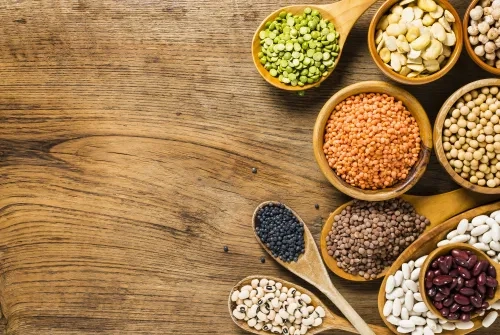Alo Yeditepe
Alo Yeditepe
8 Important Benefits of Dry Legumes
Dietitian and Phytotherapist Buket Ertaş Sefer: “Dry legumes, which are rich in plant protein, vitamins, minerals, polyphenols, and fiber, provide the body with very important nutrients. Therefore, it should be consumed at least 2-3 times a week.”
Dried legumes are one of the food groups that are indispensable to Turkish cuisine. These nutrients, which are especially rich in vegetable protein, are frequently included in pot dishes and olive oil dishes. Dietitian and Phytotherapy Specialist Buket Ertaş Sefer remarked that legume consumption is often neglected in today's world, where we compete with time and the tendency towards ready-made foods increases. Buket Ertaş Sefer explained the benefits of these foods, which should definitely make room for them at the tables, and the practical way of consumption as follows…
It Reduces Bad Cholesterol
Bad cholesterol accumulated in the blood causes vascular occlusion. Legumes do not contain cholesterol and saturated fat, on the contrary, they are rich in soluble dietary fiber and protect from heart diseases.
Prevents Constipation
It is one on one in situations where your bowel movements are difficult and take place less than normal. Because legumes contain fibers that are expelled from the body without being digested, they keep the feces softer. For example, 1 bowl of dried beans contains 17 grams of dietary fiber.
Balances Blood Sugar
The glycemic index is the classification of carbohydrate-containing foods according to the rate at which they affect blood sugar. Legumes have a low glycemic index. It keeps your blood sugar levels under control. In this way, slower destruction occurs by your digestive system. The fiber they contain leaves the stomach late and reduces the rate of glucose absorption in the intestines. As a result, your blood sugar rises slowly and there is no fasting.
Good for Iron Deficiency
If we don't have enough iron in our body, the body will produce less hemoglobin. Less hemoglobin means less oxygen in the blood. If hemoglobin decreases, oxygen to organs and tissues also decreases. As a result, iron deficiency anemia occurs. Thanks to the high iron they contain, dried legumes reduce your risk of iron deficiency.
Improves Mental Performance
In addition to being rich in B vitamins, they support the regular functioning of the nervous system thanks to the riboflavin, thiamine, niacin, and folic acid they contain. Studies are showing that it increases memory, mental performance, and learning power.
Strengthens Bones
Dried legumes protect bone development and health thanks to the calcium they contain.
Increase Body Resistance
They increase body resistance to iron, vitamin E, magnesium, and potassium from the vitamins and minerals they contain.
Provides Weight Control
Regarding weight control, although there are suggestions that alpha-amylase inhibitors in legumes may also play a role, they may be useful in weight control, as generally low glycemic index (GI) values may increase satiety.
How to Consume?
First of all, consuming various salads, or fruits with plenty of vitamin C in addition to dried legumes will increase iron absorption in your body. Legumes are deficient in the amino acid methionine, so chickpeas and dried beans become a source of quality protein when consumed with bulgur rice. You can also slow down the absorption of sugar in your body by adding yogurt and ayran to your dried beans and bulgur rice. When you cook legumes without meat, it will be logical and delicious to eat them warm during the day. You can even take it to work because you will not need heating. After boiling the legumes, dividing them into portions and keeping them in the freezer will provide you with convenience for practical consumption.
They are Not Innocent in Terms of Calories
In our culture, legumes are usually consumed with bread or rice. Although they contain many good nutrients, such as fatty seeds, even a small portion of them can contain very high energy. Consuming it in this way can lead to weight gain.
How to Cook?
Legumes are difficult to digest. Therefore, they can cause bloating, indigestion, and gas problems. This is due to the phytic acid found in legumes. Since they contain phytic acid or phytate, iron, calcium, magnesium, zinc, etc., absorption of the minerals into the body cannot happen. This prevents the body's bioavailability. Uncooked legumes are difficult to digest in this regard. Wetting it before cooking and keeping it at room temperature for about 8-10 hours before 1 night will prevent this. In order not to lose minerals and vitamins, they usually need to be cooked without salt in the water they are soaked in. Salt should be added close to cooking. However, if you have indigestion or gas problems, you should change the water you soak and boil it in that way, or you can add thyme, cumin, or coriander during cooking. The best cooking method for dry legumes is a pressure cooker. It should be enough to cook for 45-69 minutes. Cooked legumes can be stored in the refrigerator for up to 3 days.
This content was prepared by Yeditepe University Hospitals Medical Editorial Board.
”
See Also
- What is Collagen? What are the Benefits of Collagen?
- What Are the Benefits of Eating Fish? How to Choose Fresh Fish?
- How Should We Eat for a Healthy Gut?
- How Should Diabetes Patients Eat?
- What is the Lipedema Diet?
- What is Vitamin A? What are the benefits of Vitamin A?
- What is Black Cumin? What are the Benefits of Black Cumin Oil?
- What is Glutathione? What are the Benefits of Glutathione?
- What is Alpha Lipoic Acid? What are the Benefits of Alpha Lipoic Acid?
- What is Curcumin?
- Tips to Restore Balance to Your Body After New Year's Eve!
- The Relationship Between Gut Microbiota and Obesity
- Benefits of Water
- Benefits of Night Fasting
- Healthy Nutrition Suggestions during Ramadan
- 9 Tips to Enter the New Year Without Gaining Weight
- Control Your Weight During the Holiday with Small Adjustments in Your Habits
- Why Are We Hungry at Night?
- Foods to Help Quench Your Thirst on Summer Days
- Superfoods
- Nutrition Recommendations for Diabetes Patients
- Mushroom Poisoning
Alo Yeditepe



